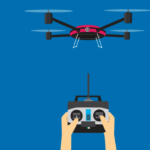 News and Commentary. It’s that time of year again: when visions of millions of drones wrapped in holiday paper prompt the U.S. government to discuss drone registration. Last week, Bloomberg News reported that the on-again, off-again, required or optional drone registration program may be restored.
News and Commentary. It’s that time of year again: when visions of millions of drones wrapped in holiday paper prompt the U.S. government to discuss drone registration. Last week, Bloomberg News reported that the on-again, off-again, required or optional drone registration program may be restored.
The Drone Registration Program
Registration was first enacted at the end of 2015 when the FAA worked with a group of stakeholders to implement a $5, online registration program for recreational drones. Drone operators fill in some very basic contact information and are given some basic rules and safety information, a registration card and a registration number in exchange. The number is supposed to be marked on any drones that the operator flies, allowing drones to be later identified and linked to that operator.
The program represented a few firsts for the agency: they utilized a collaborative approach to form the regulations, and they implemented them with record speed. The online process worked relatively smoothly, and the agency boasted hundreds of thousands of registrations.
Many industry groups and commercial operators were in favor of the program. Registration gave the FAA an opportunity to present basic flight and safety regulations and educate new fliers, which they hoped would cut down on rogue recreational operators and promote a safety culture. Online registration forestalled more drastic measures for tracking recreational drones, like point of sale registration or other costly and difficult to implement processes which might place an undue burden on manufacturers.
The Argument Against Drone Registration
Others, however, were not so happy. The AMA, whose members were already required to register, didn’t support a system which meant members had to fill out the same information twice. Others complained that personal data of operators as young as 14 would be searchable. Some felt that the $5 registration was unfair. And many in the industry simply felt that the process – passed without the usually required comment period – represented recreational drone regulation that went too far, too fast.
One recreational operator, attorney John Taylor of Maryland, took action. Taylor filed a lawsuit against the FAA, citing existing language in federal regulations which prevented the passage of new laws relating to model aircraft. And earlier this year, a Federal Appeals Court decided in his favor.
The FAA was forced to offer applicants a refund of their $5 registration fee and made the drone registration program optional rather than required.
Reinstating Drone Registration
The drone registration program was vacated based on specific language in the law passed in 2012. The FAA has two choices to reinstate the program: adjust the registration requirements or change the law. It looks like Congress has opted for the second choice. A small part of the National Defense Authorization Act for 2018 calls for the registration program to be restored as soon as the Act is passed.
Given that this is a bi-partisan compromise and expected to pass, it looks like drone registration could even be restored as mandatory prior to the holiday season. Again.

Miriam McNabb is the Editor-in-Chief of DRONELIFE and CEO of JobForDrones, a professional drone services marketplace, and a fascinated observer of the emerging drone industry and the regulatory environment for drones. Miriam has penned over 3,000 articles focused on the commercial drone space and is an international speaker and recognized figure in the industry. Miriam has a degree from the University of Chicago and over 20 years of experience in high tech sales and marketing for new technologies.
For drone industry consulting or writing, Email Miriam.
TWITTER:@spaldingbarker
Subscribe to DroneLife here.







[…] President Trump today signed the $700 billion National Defense Authorization Act, which included one small part making drone registration in the U.S. […]